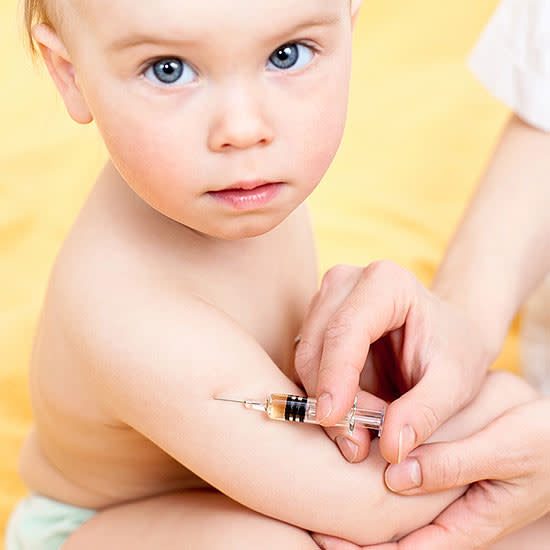Is the Chickenpox Vaccine Safe?

We often think of chickenpox as a harmless, if annoying, rite of childhood. And while it often is mild, the disease can also be very serious and even fatal. "Chickenpox can cause horrible, life-threatening complications," says Mary Anne Jackson, M.D., division director, infectious disease at Children's Mercy Hospitals and Clinics in Kansas City, Missouri, and a member of the American Academy of Pediatrics' Committee on Infectious Disease. "I've seen previously healthy children who lost all four limbs because they had chickenpox and developed a streptococcal infection, leading to soft-tissue complications."
Before the chickenpox vaccine was put into use in the U.S. in 1995 about 11,000 people were hospitalized for chickenpox each year and about 100 to 150 died from it, according to the Centers for Disease Control and Prevention (CDC). Fortunately, since the vaccine was introduced, the death rate from the disease has dropped by 97 percent in children and adolescents.
Vaccine Background
Here's the history of the vaccine: The chickenpox vaccine was first licensed in United States in 1995. At the time, it was a one-dose vaccine. In 2006, a second dose of the vaccine was added. The CDC and the American Academy of Pediatrics (AAP) recommend that children who have never had chickenpox get both doses: the first when they are between 12 and 15 months of age and the second between 4 and 6 years of age. People age 13 and older who have never had chickenpox or the chickenpox vaccine should get two doses spaced at least 28 days apart. According to the latest numbers, close to 90 percent of American children have been vaccinated against chickenpox, says Dr. Jackson.
In the time the vaccine has been in use, experts have found it to be extremely effective. "We've had a decade and a half to see how the vaccine works, and in virtually 100 percent of cases the vaccine will prevent severe illness in otherwise healthy individuals," says Dr. Jackson. If someone who is vaccinated does get chickenpox he will have a much milder case.
So Is It Safe?
Time has shown that the chickenpox vaccine works but the big question for many parents is, "Is it safe?" The experts say yes. The AAP recommends that children who are able to get the chickenpox vaccine do so. (There are some instances in which children shouldn't get the vaccine or should wait -- if they have cancer, for example. Talk to your doctor about your child's specific situation.) Since the vaccine was licensed, millions of doses have been given to children in the United States, according to the AAP, which adds that many studies show that the vaccine is safe and effective. Dr. Jackson agrees. "Vaccines are held to the ultimate safety standards, and vaccine trials involve large numbers of people," she says. More proof of her comfort with the vaccine: "My own granddaughter will get the vaccine later this year, when she turns 1."
Other parents may wonder if the vaccine is really necessary. Their thinking is, "I had chickenpox as a child, and I'm fine, so why vaccinate my child?" The problem is that with "wild chickenpox" (the one you can catch as opposed to the weakened version of the virus that's in the vaccine) you never know if your child will get a mild case or be one of the people who experiences serious complications. "We cannot distinguish who is going to get grievously ill and who will be fine," says Rodney E. Willoughby, M.D., a pediatric infectious disease specialist at Children's Hospital of Wisconsin, professor of pediatrics at the Medical College of Wisconsin, and a member of the AAP's committee on infectious disease. "Even worse, we can't say you won't transmit the disease to somebody else who is pregnant or immunosuppressed -- say, from cancer -- where chickenpox kills more readily. So why mess around?"
Another Plus
Besides protecting healthy children who get immunized, widespread use of the vaccine is helping another more vulnerable group of kids -- those who can't be vaccinated either because they are too young or because they have a medical condition. Research published in the journal Pediatrics in November 2011 reported that even though babies are too young to be vaccinated for chickenpox they were indirectly reaping the benefits of older children being immunized. In fact, the CDC found that from the time the chickenpox vaccine came into use in the U.S. through 2008, incidences of chickenpox in children under age 1 fell by almost 90 percent. The reason: Because so much of the population is now immune to chickenpox, babies have a lower risk of being exposed to the disease.
Side Effects
All vaccines (and medications, for that matter) can have side effects, but the ones reported with the chickenpox vaccine occur infrequently and are usually extremely mild. According to the CDC, the most common side effects of the chickenpox vaccine are soreness on the arm where the shot was given (which occurs in 1 out of 5 children) and a mild rash up to one month after vaccination (which occurs in 1 out of 25 people). Serious side effects are very rare but can include seizures and pneumonia. "With virtually every vaccine that we have for children, the natural disease is considered much worse than any possible side effects that can come from the vaccine," says Dr. Jackson.
All content on this Web site, including medical opinion and any other health-related information, is for informational purposes only and should not be considered to be a specific diagnosis or treatment plan for any individual situation. Use of this site and the information contained herein does not create a doctor-patient relationship. Always seek the direct advice of your own doctor in connection with any questions or issues you may have regarding your own health or the health of others.